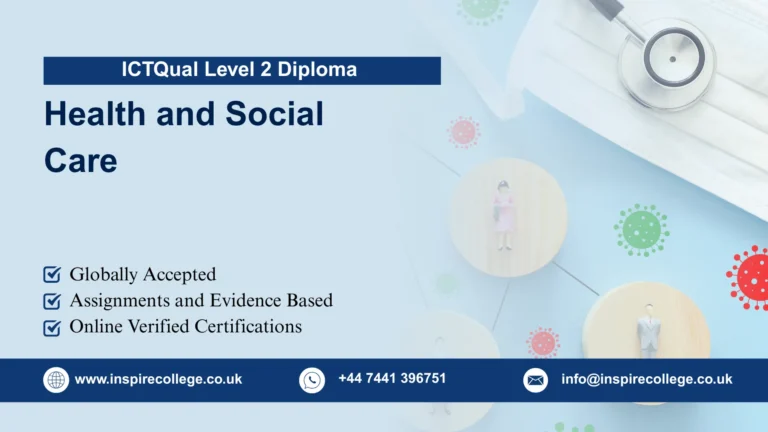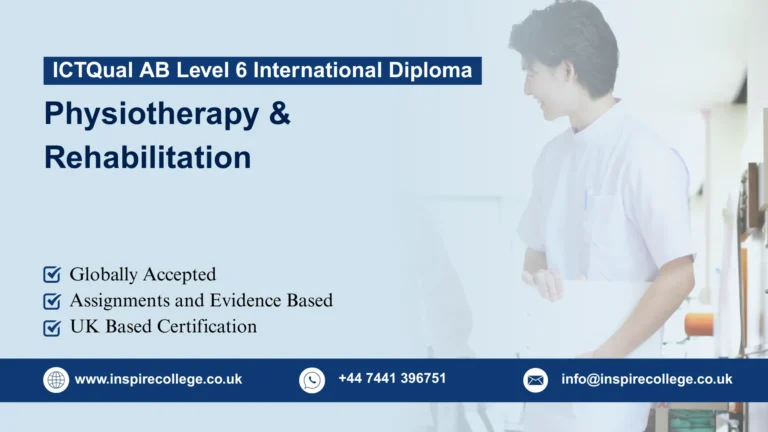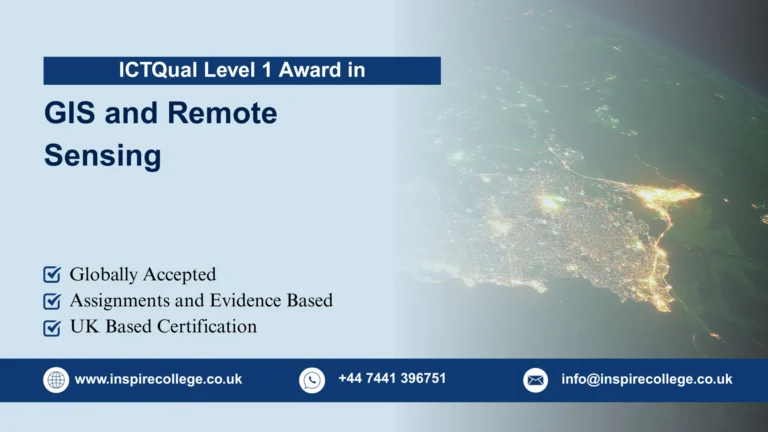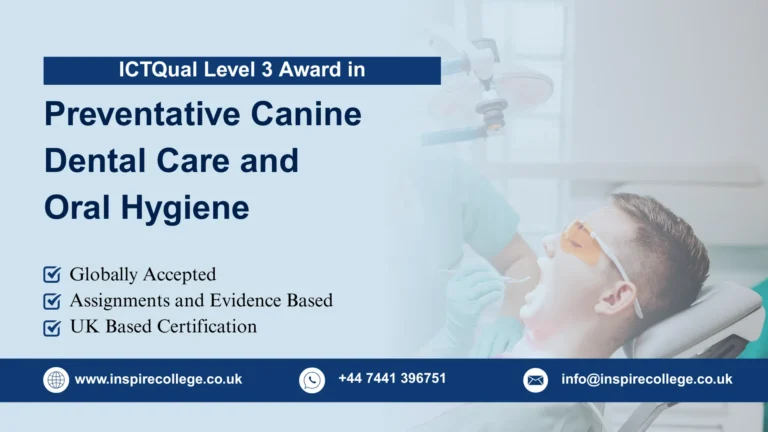
ICTQual AB Level 6 International Diploma in Public Health & Epidemiology
Mandatory Units
This qualification, the ICTQual AB Level 6 International Diploma in Public Health & Epidemiology 360 Credits – Three Years, consists of 36 mandatory units.
Learning Outcomes for the Level 6 International Diploma in Public Health & Epidemiology 360 Credits – Three Years:
Year 1: Foundational Knowledge
By the end of Year 1, learners will be able to:
Introduction to Public Health
- Understand the key concepts and principles of public health practice.
- Identify the roles of public health professionals in community and global health.
- Analyse health challenges and determinants affecting populations.
Fundamentals of Epidemiology
- Apply basic epidemiological methods to study disease patterns.
- Interpret incidence, prevalence, and risk factors in populations.
- Design simple observational studies and health surveys.
Human Anatomy and Physiology for Public Health
- Describe the structure and function of major human body systems.
- Understand physiological mechanisms relevant to disease and health.
- Relate anatomy and physiology to public health interventions.
Biostatistics and Health Data Analysis
- Collect, analyse, and interpret health-related data.
- Use statistical tools to summarise and present health information.
- Apply basic quantitative methods to support evidence-based decisions.
Principles of Microbiology and Infection Control
- Identify common microorganisms and their impact on health.
- Apply infection control measures in community and clinical settings.
- Understand pathogen transmission and prevention strategies.
Health Promotion and Disease Prevention
- Design strategies to promote healthy lifestyles and behaviours.
- Implement community-level health interventions.
- Evaluate the effectiveness of disease prevention programmes.
Nutrition and Community Health
- Assess nutritional needs of populations.
- Analyse the impact of diet on public health outcomes.
- Develop nutrition-based health promotion strategies.
Environmental Health and Sustainability
- Recognise environmental factors affecting public health.
- Evaluate sustainable practices to reduce health risks.
- Promote environmental health awareness in communities.
Health Policy and Systems Overview
- Understand healthcare system structures and policy frameworks.
- Analyse policy impacts on population health outcomes.
- Identify strategies to improve public health service delivery.
Communication Skills for Health Professionals
- Demonstrate effective verbal and written communication in healthcare settings.
- Engage with communities to convey health messages clearly.
- Apply interpersonal skills to enhance collaboration with stakeholders.
Ethics and Professional Conduct in Public Health
- Understand ethical principles in public health practice.
- Apply professional standards in community and research settings.
- Evaluate ethical dilemmas and propose appropriate solutions.
Introduction to Research Methods in Health Sciences
- Identify basic research designs and methodologies.
- Conduct literature reviews to support public health research.
- Apply fundamental principles of data collection and analysis.
Year 2: Intermediate Proficiency
By the end of Year 2, learners will be able to:
Advanced Epidemiology and Study Design
- Design and conduct advanced epidemiological studies.
- Analyse complex datasets to identify health trends.
- Critically appraise epidemiological literature for evidence-based practice.
Infectious Disease Control and Prevention
- Develop strategies to prevent and control infectious diseases.
- Monitor outbreaks and implement intervention measures.
- Apply public health guidelines for vaccination and immunisation programmes.
Non-Communicable Diseases and Chronic Care Management
- Understand risk factors and management strategies for chronic diseases.
- Design community-based interventions for disease prevention.
- Analyse health data to monitor chronic disease trends.
Global Health Issues and Health Systems
- Evaluate global health challenges and disparities.
- Examine international health policies and frameworks.
- Propose interventions to address global public health priorities.
Health Economics and Policy Implementation
- Apply economic principles to public health decision-making.
- Assess cost-effectiveness of health interventions and programmes.
- Understand resource allocation in health systems.
Public Health Surveillance and Monitoring
- Implement surveillance systems to track population health.
- Analyse surveillance data to detect health threats.
- Develop reporting strategies for timely public health responses.
Occupational and Environmental Health
- Assess workplace hazards and environmental risks.
- Recommend interventions to promote occupational health.
- Evaluate policies for environmental and occupational safety.
Community Health Assessment and Planning
- Conduct needs assessments for community health programmes.
- Plan and implement interventions based on assessment findings.
- Engage stakeholders to promote sustainable health initiatives.
Health Informatics and Digital Health Systems
- Use digital tools to collect and manage health information.
- Analyse health data to support decision-making.
- Apply informatics solutions to improve healthcare delivery.
Programme Evaluation and Impact Assessment
- Evaluate public health programmes for effectiveness and efficiency.
- Use quantitative and qualitative methods to assess outcomes.
- Develop reports and recommendations for programme improvement.
Leadership and Teamwork in Public Health
- Demonstrate leadership in planning and implementing health projects.
- Collaborate effectively with multidisciplinary teams.
- Apply management principles in public health practice.
Applied Research Methods in Epidemiology
- Design applied research projects in epidemiology.
- Collect, analyse, and interpret health data for research purposes.
- Present research findings to inform policy and practice.
Year 3: Advanced Specialization and Application
By the end of Year 3, learners will be able to:
Advanced Public Health Interventions
- Plan and implement large-scale health interventions.
- Evaluate the effectiveness and sustainability of interventions.
- Develop strategies to address complex public health challenges.
Clinical Epidemiology and Evidence-Based Practice
- Apply clinical epidemiology methods to public health scenarios.
- Integrate research evidence into policy and practice decisions.
- Critically evaluate clinical guidelines and their population impact.
Health Risk Assessment and Management
- Conduct risk assessments for communities and workplaces.
- Develop mitigation strategies for identified health risks.
- Monitor and review the effectiveness of risk management plans.
Biostatistics for Advanced Research
- Apply advanced statistical methods to health research.
- Analyse large datasets using appropriate software tools.
- Interpret complex statistical results to inform public health decisions.
Global Health Policy and Strategy Development
- Develop strategies to address international health priorities.
- Analyse global health policies and their implementation challenges.
- Recommend evidence-based policy solutions for population health improvement.
Emergency Preparedness and Disaster Management
- Plan and coordinate public health responses to emergencies.
- Assess and manage health risks during natural and man-made disasters.
- Develop disaster response protocols and communication strategies.
Maternal and Child Health Epidemiology
- Analyse health indicators for mothers and children.
- Develop interventions to improve maternal and child health outcomes.
- Evaluate public health programmes targeting maternal and child populations.
Advanced Communicable Disease Control
- Apply advanced methods for outbreak investigation and control.
- Develop intervention strategies for emerging and re-emerging diseases.
- Monitor and report on communicable disease trends.
Health Communication and Advocacy
- Design effective health communication campaigns.
- Advocate for public health policies and community engagement.
- Use media and digital tools to disseminate public health messages.
Quality Improvement and Risk Management in Healthcare
- Implement quality improvement strategies in public health programmes.
- Identify and manage risks to improve healthcare outcomes.
- Apply continuous improvement models to organisational practices.
Capstone Research Project / Dissertation
- Plan and conduct a comprehensive public health research project.
- Analyse and interpret research findings to address real-world health issues.
- Present results in a professional report with actionable recommendations.
Professional Practice and Field Placement
- Apply theoretical knowledge in practical public health settings.
- Develop professional competencies through hands-on experience.
- Demonstrate ethical, effective, and evidence-based public health practice.
The ICTQual AB Level 6 International Diploma in Public Health & Epidemiology is designed for motivated individuals from diverse educational and professional backgrounds who aspire to make a positive impact on population health, disease prevention, and global healthcare systems. This internationally recognised qualification is ideal for:
1. Fresh School Leavers
- Learners who have recently completed their secondary education and wish to begin a career in healthcare and public health.
- Provides a strong academic and practical foundation to start a career in epidemiology, health promotion, and disease prevention.
2. Aspiring Healthcare Professionals
- Individuals aiming to enter the global healthcare sector through a specialised field.
- Offers career prospects in hospitals, research centres, NGOs, and government health agencies.
3. Current Healthcare Practitioners
- Nurses, medical assistants, community health workers, or allied health professionals who want to specialise in epidemiology, health policy, or disease surveillance.
- Supports career growth and transition into leadership roles within public health.
4. International Learners
- Students worldwide who want a globally relevant diploma preparing them to work in diverse healthcare systems.
- Builds cross-cultural understanding and adaptability for tackling international health challenges.
5. Career Changers
- Professionals from non-medical fields who are passionate about public health and want to move into a rewarding healthcare profession.
- Provides a structured pathway into a high-demand sector with global career opportunities.
Why This Diploma is Ideal
This programme is perfect for learners who want to:
- Gain specialised skills in epidemiology, disease surveillance, global health policy, and community health strategies.
- Develop competence, confidence, and professional recognition in the international public health sector.
- Pursue global career opportunities or progress into advanced postgraduate studies in public health, epidemiology, or healthcare management.
By completing this three-year, 360-credit programme, learners acquire the skills, knowledge, and international recognition needed to thrive in the fast-growing field of public health and epidemiology.
As an ICTQual AB Approved Training Centre, we provide learners with two flexible pathways to achieve the Level 6 International Diploma in Public Health & Epidemiology. All learners must enrol with our centre to register, access study materials, and complete assessments.
Route 1 – Experienced Professionals
- Designed for learners with at least 6 years of verifiable professional experience in public health, healthcare management, epidemiology, or community health.
- Learners are required to submit evidence of prior work, responsibilities, and achievements that demonstrate competence in areas such as disease surveillance, outbreak response, and health policy implementation.
- Our centre evaluates each learner’s existing knowledge and skills against the diploma’s learning outcomes.
- If minor gaps are identified, we provide targeted training or guidance to ensure full alignment with international standards.
- Once verified, learners can achieve the diploma without completing all 36 assignments, allowing for a fast-track route to certification and global recognition.
Route 2 – Fresh Learners
- Designed for learners who are new to public health or healthcare disciplines.
- Fresh learners must complete the full three-year, 360-credit programme, which includes 36 assignments, case studies, and practical assessments.
- The programme is structured to develop both theoretical knowledge and practical expertise in epidemiology, health data analysis, and community health strategies.
- Upon successful completion, learners are awarded the ICTQual AB Level 6 International Diploma in Public Health & Epidemiology, recognised worldwide.
Global Value of the Qualification
Both certification routes ensure that learners receive a globally respected qualification that opens doors to careers in government health agencies, international NGOs, hospitals, and research institutions, or progression to advanced postgraduate studies.
Register Now
FAQs for ICTQual AB Level 6 International Diploma in Public Health & Epidemiology






